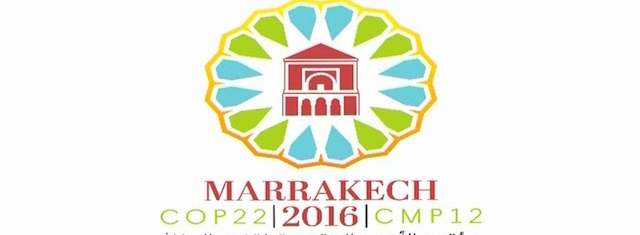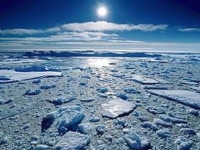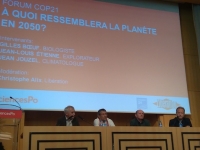Vips
SEGOLENE ROYAL & J LOUIS ETIENNE TRAVEL TO THE ARCTIC IN A SCIENTIFIC EXPEDITION
AS PRESIDENT OF COP21

COP22 logo (Source: Courtesy COP22)
USPA NEWS -
Segolene Royal, President of COP21, moves to the Arctic as part of a scientific expedition with Jean-Louis Etienne, the first to cross the Arctic alone, and Gilles Boeuf, scientific advisor on the issues of global warming (following the work of the Arctic circle and Arctic roadmap).
Segolene Royal, President of COP21, moves to the Arctic as part of a scientific expedition with Jean-Louis Etienne, the first to cross the Arctic alone, and Gilles Boeuf, scientific advisor on the issues of global warming (following the work of the Arctic circle and Arctic roadmap). The Arctic is the area of the most affected by global warming planet. "The snow changes color," said Jean-Louis Etienne. The Arctic has a global dimension since "climate machine" is the exchange between the heat of the earth and the cold poles. The visit of the French presence, actors and witnesses of global warming, and presentations of research are the word of credibility tools.
HERE IS THE PROGRAM OF THE ARCTIC EXPEDITION----------------------------------------------------------------------------
1st day
- Oslo
2nd day
- Ny-Alesund
- Home to AWIPEV-Base, security issues by Verena Mohaupt Station Leader (Zeppelin Seminar Room)
3rd day
- Welcome by the director Kings Bay Ole Oiseth: Ny-Alesund, History and Strategy for the Future
- Science of the French Polar Institute Paul-Emile Victor (IPEV) in Spitsbergen and the Arctic (Pascal Morin)
- Visit marine laboratory Kings Bay
- Visit the Sverdrup Station, Norwegian Polar Institute
- Participation in the launch of a daily weather balloon
- Project Presentation and observatory AWIPEV basis and presentation of the plan for the new building AWIPEV (Verena Mohaupt, Pascal Morin, Denis Mercier)
- Visit the Zeppelin Observatory
- Visit Kartverket and new geodetic VLBI antenna (very-long-baseline interferometry) to Brandalspynten
4th day
- Boat Kongsfjord, visit forehead Glacier
- Arrive at Corbel base by boat, the tower base
- Information on the activities of French glaciology (Florian Tolle), walk to the glacier and moraine
- Walk to the cliff birds, information on the ornithological program (Olivier Chastel)
5th day
- Visit the permafrost observatory AWIPEV to Bayelva and Italian weather tower (Stefano Ponti, Italian scientist, base leader)
- Visit Kongsfjordbutikken the most store north of the world
- Visit the museum
JEAN LOUIS ETIENNE IS A SPECIALIST OF THE ARCTC THE FIRST MAN TO REACH THE NORTH POLE----------Jean :ours Etienne graduated in medicine, biology and sports medicine, Jean-Louis Etienne is above all a man of great curiosity and a love of nature. Consequently, it spends less on medicine than his passion: discovering the world. By the 1970s, he participated in numerous expeditions in different forms (sailing, mountaineering), some of which contribute significantly to its reputation. In 1986, he became the first man to reach the North Pole solo by pulling his sleigh for 63 days. During this experience, he became convinced that the adventure is a great transmitter of values. Since he made each of his expeditions a bridge between science and the general public.------------------------------------------------------------------------------
In 1989-1990, he made crossing the white continent via the South Pole with an international team and dogs (Transantarctica). He traveled 6,300 km across Antarctica, draws alarming findings for the planet and continues since then to warn of the dangers which threaten it. After this expedition and thanks to its action, the Madrid Protocol on Environmental Protection to the Antarctic was adopted (1991). It transforms the white continent as a natural reserve devoted to peace and science, for fifty years. Jean-Louis Etienne is constantly working pedagogy of his adventures. Early on, he comes in contact with officials of National Education and offers its shipping reports, available on Minitel program to teachers. It conducts, between 1990 and 1996, several educational purposes shipments to publicize the polar regions and understand the role they play on the life and climate of the earth. On board the polar schooner Antarctica, he left for Patagonia, South Georgia and the Antarctic Peninsula (1991-1992). This educational and scientific trip aims to make clear that the survival of the scenic beauty of the extreme south is due to subtle balance it is important to preserve. In 1994 he participated in the discovery of Erebus volcano, the only activity in the Antarctic continent, and made the first wintering in Spitsbergen, north-west of Norway.In 2002, he completed four months of drift aboard the Polar Observer (ice mission) for a first program of study and action on global warming across four observation areas: weather, ice, atmosphere and ocean. All data collected for analyzing the sharp decline of sea ice. During the winter of 2004-2005, he led a team of researchers from the Natural History Museum, the Research Institute for Development and the Centre national de la recherche scientifique on the tropical atoll of Clipperton in order to achieve inventory of biodiversity and the marine environment in the Pacific area.
JEAN LOUIS ETIENNE WAS DECORATED BY THE LEGION D'HONNEUR-----------------------------------------------------
In 2006, the interest of his travels to research and his constant pedagogical concern are rewarded with a promotion to the rank of Officer in the National Order of the Legion of Honor. In 2007, he briefly headed the Oceanographic Institute of the Foundation Albert 1st in Monaco, while considering to make crossing the glacial Arctic Ocean in an airship. This expedition to measure the thickness of the ice is finally canceled after an accident that damages the airship. Moreover, since 2009 he is member of the Polar Environment Committee (PEC). In this instance, instituted with the Minister for the Environment, participates in checking the compatibility of human activities within the French authorities in the polar and sub-Antarctic regions, with the environmental preservation. It is consulted on work programs, major projects, impact studies and on all matters relating to the polar environment. April 5, 2010, aboard a balloon filled with helium, Jean-Louis Etienne makes the first crossing by balloon over the Arctic Ocean during shipping Generali Arctic observe. It takes off from Spitsbergen in command of a rozière a mixed helium balloon and hot air. When he gets near the North Pole, a storm chase the ball to Siberia where he lands after five days of a complicated journey (electrical failure, fire on a burner, vol 200 meters of ice, etc.), mostly blind. These harsh conditions do not prevent it from taking unprecedented measures on the composition of the atmosphere above the North Pole and conduct scientific measurements on atmospheric CO2 content and aerosols in a blank area of “‹“‹any issue. The data collected for the laboratory of climate and environmental sciences contribute to better understanding of the carbon cycle on the planet and simulation models of climate change. He is always willing to share his knowledge and questions about the future of our planet, Jean-Louis Etienne took notes at each of its shipments. In recent years, notably publishes books relating his scientific trip to the island of Clipperton or the North Pole crossing by balloon. In 2011 he wrote New natural histories, work in which he offers his analysis on the global situation. In the same vein, it is a popular speaker for its rigorous and warm phrasing. Thus, on 20 October 2012, gives to the city of success, a conference entitled What technological research for successful energy transition? 12 to 18 December 2012, he toured the United States entitled Oceans and ice caps: what the poles tell us about our future, in which he discusses the evolution, for 30 years, glacial areas and he loves explains that the polar science brings to the understanding of the impact of human activities on the balance of the Earth.
Cop21 Cop22 Conference Of Parties Paris Marrakech Unfccc Segolene Royal Jean Louis Etienne Arctic Rahma Sophia Rachdi
Liability for this article lies with the author, who also holds the copyright. Editorial content from USPA may be quoted on other websites as long as the quote comprises no more than 5% of the entire text, is marked as such and the source is named (via hyperlink).








